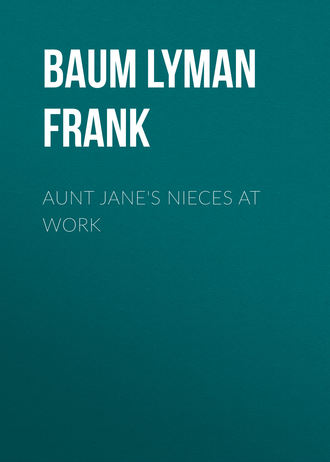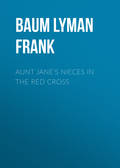
Лаймен Фрэнк Баум
Aunt Jane's Nieces at Work
CHAPTER XI
A MYSTERIOUS DISAPPEARANCE
A woman was sitting in a low room, engaged in knitting. Her feet were stretched out toward a small fire that smouldered in an open hearth. She wore a simple calico gown, neat and well-fitting, and her face bore traces of much beauty that time and care had been unable wholly to efface.
Suddenly she paused in her work, her head turned slightly to one side to listen.
"Come in, sir," she called in a soft but distinct voice; "come in, miss."
So Kenneth and Beth entered at the half-open porch door and advanced into the room.
"Is this Mrs. Rogers?" asked Beth, looking at the woman curiously. The woman's eyes were closed, but the lashes fell in graceful dark curves over her withered cheeks. The girl wondered how she had been able to know her visitors' sex so accurately.
"Yes, I am Mrs. Rogers," said the sweet, sad voice. "And I think you are one of the young ladies from Elmhurst – perhaps the one Will talked to."
"You are right, Mrs. Rogers. I am Elizabeth DeGraf."
"And your companion – is it Mr. Forbes?" the woman asked.
"Yes, madam," replied Kenneth, astonished to find Will's wife speaking with so much refinement and gracious ease.
"You are very welcome. Will you please find seats? My affliction renders me helpless, as you may see."
"We are very comfortable, I assure you, Mrs. Rogers," said Beth. "We have come to ask if you have heard anything of your daughter."
"Not a word as yet, Miss DeGraf, Will is out with the horse and buggy doing his best to get information. But Lucy has been gone so long now that I realize it will be difficult to find her, if, indeed, the poor girl has not – is not – "
Her voice broke.
"Oh, you don't fear that, do you, Mrs. Rogers?" asked Beth, quickly.
"I fear anything – everything!" wailed the poor creature, the tears streaming from between her closed lids. "My darling was frantic with grief, and she couldn't bear the humiliation and disgrace of her position. Will told you, didn't he?"
"Yes, of course. But it wasn't so bad, Mrs. Rogers; it wasn't a desperate condition, by any means."
"With poor Tom in prison for years – and just for trying to help her."
"Tom isn't in prison, you know, any more," said Beth quietly. "He has been released."
"Released! When?"
"Last evening. His fault has been forgiven, and he is now free."
The woman sat silent for a time. Then she asked:
"You have done this, Mr. Forbes?"
"Why, Miss DeGraf and I assisted, perhaps. The young man is not really bad, and – "
"Tom's a fine boy!" she cried, with eagerness. "He's honest and true, Mr. Forbes – he is, indeed!"
"I think so," said Kenneth.
"If he wasn't my Lucy would never have loved him. He had a bright future before him, sir, and that's why my child went mad when he ruined his life for her sake."
"Was she mad, do you think?" asked Beth, softly.
"She must have been," said the mother, sadly. "Lucy was a sensible girl, and until this thing happened she was as bright and cheerful as the day is long. But she is very sensitive – she inherited that from me, I think – and Tom's action drove her distracted. At first she raved and rambled incoherently, and Will and I feared brain fever would set in. Then she disappeared in the night, without leaving a word or message for us, which was unlike her – and we've never heard a word of her since. The – the river has a strange fascination for people in that condition. At times in my life it has almost drawn me into its depths – and I am not mad. I have never been mad."
"Let us hope for the best, Mrs. Rogers," said Beth. "Somehow, I have an idea this trouble will all turn out well in the end."
"Have you?" asked the woman, earnestly.
"Yes. It all came about through such a little thing – merely an unjust accusation."
"The little things are the ones that ruin lives," she said. "Will you let me tell you something of myself? You have been so kind to us, my dear, that I feel you ought to know."
"I shall be glad to know whatever you care to tell me," said Beth, simply.
"I am the wife of a poor farmer," began the woman, speaking softly and with some hesitation, but gaining strength as she proceeded. "As a girl I was considered attractive, and my father was a man of great wealth and social standing. We lived in Baltimore. Then I fell in love with a young man who, after obtaining my promise to marry him, found some one he loved better and carelessly discarded me. As I have said, I have a sensitive nature. In my girlhood I was especially susceptible to any slight, and this young man's heartless action made it impossible for me to remain at home and face the humiliation he had thrust upon me. My father was a hard man, and demanded that I marry the man he had himself chosen; but I resented this command and ran away. My mother had passed on long before, and there was nothing to keep me at home. I came west and secured a position to teach school in this county, and for a time I was quite contented and succeeded in living down my disappointment. I heard but once from my father. He had married again and disinherited me. He forbade me to ever communicate with him again.
"At that time Will Rogers was one of the most promising and manly of the country lads around here. He was desperately in love with me, and at this period, when I seemed completely cut off from my old life and the future contained no promise, I thought it best to wear out the remainder of my existence in the seclusion of a farm-house. I put all the past behind me, and told Will Rogers I would marry him and be a faithful wife; but that my heart was dead. He accepted me on that condition, and it was not until after we were married some time that my husband realized how impossible it would ever be to arouse my affection. Then he lost courage, and became careless and reckless. When our child came – our Lucy – Will was devoted to her, and the baby wakened in me all the old passionate capacity to love. Lucy drew Will and me a little closer together, but he never recovered his youthful ambition. He was a disappointed man, and went from bad to worse. I don't say Will hasn't always been tender and true to me, and absolutely devoted to Lucy. But he lost all hope of being loved as he loved me, and the disappointment broke him down. He became an old man early in life, and his lack of energy kept us very poor. I used to take in sewing before the accident to my eyes, and that helped a good deal to pay expenses. But now I am helpless, and my husband devotes all his time to me, although I beg him to work the farm and try to earn some money.
"I wouldn't have minded the poverty; I wouldn't mind being blind, even, if Lucy had been spared to me. I have had to bear so much in my life that I could even bear my child's death. But to have her disappear and not know what has become of her – whether she is living miserably or lying at the bottom of the river – it is this that is driving me distracted."
Kenneth and Beth remained silent for a time after Mrs. Rogers had finished her tragic story, for their hearts were full of sympathy for the poor woman. It was hard to realize that a refined, beautiful and educated girl had made so sad a mistake of her life and suffered so many afflictions as a consequence. That old Will had never been a fitting mate for his wife could readily be understood, and yet the man was still devoted to his helpless, unresponsive spouse. The fault was not his.
The boy and the girl both perceived that there was but one way they could assist Mrs. Rogers, and that was to discover what had become of her child.
"Was Lucy like you, or did she resemble her father?" asked Beth.
"She is – she was very like me when I was young," replied the woman. "There is a photograph of her on the wall there between the windows; but it was taken five years ago, when she was a child. Now she is – she was eighteen, and a well-developed young woman."
"I've been looking at the picture," said Kenneth.
"And you mustn't think of her as dead, Mrs. Rogers," said Beth, pleadingly. "I'm sure she is alive, and that we shall find her. We're going right to work, and everything possible shall be done to trace your daughter. Don't worry, please. Be as cheerful as you can, and leave the search to us."
The woman sighed.
"Will believes she is alive, too," she said. "He can't sleep or rest till he finds her, for my husband loves her as well as I do. But sometimes I feel it's wicked to hope she is alive. I know what she suffers, for I suffered, myself; and life isn't worth living when despair and disappointment fills it."
"I cannot see why Lucy shouldn't yet be happy," protested Beth. "Tom Gates is now free, and can begin life anew."
"His trouble will follow him everywhere," said Mrs. Rogers, with conviction. "Who will employ a bookkeeper, or even a clerk who has been guilty of forgery?"
"I think I shall give him employment," replied Kenneth.
"You, Mr. Forbes!"
"Yes. I'm not afraid of a boy who became a criminal to save the girl he loved."
"But all the world knows of his crime!" she exclaimed.
"The world forgets these things sooner than you suppose," he answered. "I need a secretary, and in that position Tom Gates will quickly be able to live down this unfortunate affair. And if he turns out as well as I expect, he will soon be able to marry Lucy and give her a comfortable home. So now nothing remains but to find your girl, and we'll try to do that, I assure you."
Mrs. Rogers was crying softly by this time, but it was from joy and relief. When they left her she promised to be as cheerful as possible and to look on the bright side of life.
"I can't thank you," she said, "so I won't try. You must know how grateful we are to you."
As Beth and Kenneth drove back to Elmhurst they were both rather silent, for they had been strongly affected by the scene at the farm-house.
"It's so good of you, Ken, to take Tom Gates into your employ," said the girl, pressing her cousin's arm. "And I'm sure he'll be true and grateful."
"I really need him, Beth," said the boy. "There is getting to be too much correspondence for Mr. Watson to attend to, and I ought to relieve him of many other details. It's a good arrangement, and I'm glad I thought of it."
They had almost reached Elmhurst when they met the Honorable Erastus Hopkins driving along the road. On the seat beside him was a young girl, and as the vehicles passed each other Beth gave a start and clung to the boy's arm.
"Oh, Ken!" she cried, "did you see? Did you see that?"
"Yes; it's my respected adversary."
"But the girl! It's Lucy – I'm sure it's Lucy! She's the living image of Mrs. Rogers! Stop – stop – and let's go back!"
"Nonsense, Beth," said the boy. "It can't be."
"But it is. I'm sure it is!"
"I saw the girl," he said. "She was laughing gaily and talking with the Honorable Erastus. Is that your idea of the mad, broken-hearted Lucy Rogers?"
"N-no. She was laughing, Ken, I noticed it."
"And she wasn't unhappy a bit. You mustn't think that every pretty girl with dark eyes you meet is Lucy Rogers, you know. And there's another thing."
"What, Ken?"
"Any companion of Mr. Hopkins can be easily traced."
"That's true," answered the girl, thoughtfully. "I must have been mistaken," she added, with a sigh.
CHAPTER XII
BETH MEETS A REBUFF
The campaign was now growing warm. Mr. Hopkins had come to realize that he had "the fight of his life" on his hands, and that defeat meant his political ruin. Close-fisted and miserly as he was, no one knew so well as the Honorable Erastus how valuable this position of Representative was to him in a financial way, and that by winning re-election he could find means to reimburse himself for all he had expended in the fight. So, to the surprise of the Democratic Committee and all his friends, Mr. Hopkins announced that he would oppose Forbes's aggressive campaign with an equal aggressiveness, and spend as many dollars in doing so as might be necessary.
He did not laugh at his opponents any longer. To himself he admitted their shrewdness and activity and acknowledged that an experienced head was managing their affairs.
One of Mr. Hopkins's first tasks after calling his faithful henchmen around him was to make a careful canvass of the voters of his district, to see what was still to be accomplished.
This canvass was quite satisfactory, for final report showed only about a hundred majority for Forbes. The district was naturally Republican by six hundred majority, and Hopkins had previously been elected by a plurality of eighty-three; so that all the electioneering of the girl politicians, and the expenditure of vast sums of money in painting fences and barns, buying newspapers and flaunting Forbes banners in the breezes, had not cut into the Hopkins following to any serious extent.
But, to offset this cheering condition, the Democratic agents who made the canvass reported that there was an air of uncertainty throughout the district, and that many of those who declared for Hopkins were lukewarm and faint-hearted, and might easily be induced to change their votes. This was what must be prevented. The "weak-kneed" contingency must be strengthened and fortified, and a couple of hundred votes in one way or another secured from the opposition.
The Democratic Committee figured out a way to do this. Monroe County, where both Forbes and Hopkins resided, was one of the Democratic strongholds of the State. The portions of Washington and Jefferson Counties included in the Eighth District were as strongly Republican, and being more populous gave to the district its natural Republican majority. On the same ticket that was to elect a Representative to the State Legislature was the candidate for Sheriff of Monroe County. A man named Cummings was the Republican and Seth Reynolds, the liveryman, the Democratic nominee. Under ordinary conditions Reynolds was sure to be elected, but the Committee proposed to sacrifice him in order to elect Hopkins. The Democrats would bargain with the Republicans to vote for the Republican Sheriff if the Republicans would vote for the Democratic Representative. This "trading votes," which was often done, was considered by the politicians quite legitimate. The only thing necessary was to "fix" Seth Reynolds, and this Hopkins arranged personally. The office of Sheriff would pay about two thousand a year, and this sum Hopkins agreed to pay the liveryman and so relieve him of all the annoyance of earning it.
Reynolds saw the political necessity of this sacrifice, and consented readily to the arrangement. Mr. Cummings, who was to profit by the deal, was called to a private consultation and agreed to slaughter Kenneth Forbes to secure votes for himself. It was thought that this clever arrangement would easily win the fight for Hopkins.
But the Honorable Erastus had no intention of "taking chances," or "monkeying with fate," as he tersely expressed it. Every scheme known to politicians must be worked, and none knew the intricate game better than Hopkins. This was why he held several long conferences with his friend Marshall, the manager at the mill. And this was why Kenneth and Beth discovered him conversing with the young woman in the buggy. Mr. Hopkins had picked her up from the path leading from the rear gate of the Elmhurst grounds, and she had given him accurate information concerning the movements of the girl campaigners. The description she gave of the coming reception to the Woman's Political League was so humorous and diverting that they were both laughing heartily over the thing when the young people passed them, and thus Mr. Hopkins failed to notice who the occupants of the other vehicle were.
He talked for an hour with the girl, gave her explicit instructions, thrust some money into her hand, and then drove her back to the bend in the path whence she quickly made her way up to the great house.
Louise was making great preparations to entertain the Woman's Political League, an organization she had herself founded, the members of which were wives of farmers in the district. These women were flattered by the attention of the young lady and had promised to assist in electing Mr. Forbes. Louise hoped for excellent results from this organization and wished the entertainment to be so effective in winning their good-will that they would work earnestly for the cause in which they were enlisted.
Patsy and Beth supported their cousin loyally and assisted in the preparations. The Fairview band was engaged to discourse as much harmony as it could produce, and the resources of the great house were taxed to entertain the guests. Tables were spread on the lawn and a dainty but substantial repast was to be served.
The day of the entertainment was as sunny and mild as heart could desire.
By ten o'clock the farm wagons began to drive up, loaded with women and children, for all were invited except the grown men. This was the first occasion within a generation when such an entertainment had been given at Elmhurst, and the only one within the memory of man where the neighbors and country people had been invited guests. So all were eager to attend and enjoy the novel event.
The gardens and grounds were gaily decorated with Chinese and Japanese lanterns, streamers and Forbes banners. There were great tanks of lemonade, and tables covered with candies and fruits for the children, and maids and other servants distributed the things and looked after the comfort of the guests. The band played briskly, and before noon the scene was one of great animation. A speakers' stand, profusely decorated, had been erected on the lawn, and hundreds of folding chairs provided for seats. The attendance was unexpectedly large, and the girls were delighted, foreseeing great success for their fjte.
"We ought to have more attendants, Beth," said Louise, approaching her cousin. "Won't you run into the house and see if Martha can't spare one or two more maids?"
Beth went at once, and found the housekeeper in her little room. Martha was old and somewhat feeble in body, but her mind was still active and her long years of experience in directing the household at Elmhurst made her a very useful and important personage. She was very fond of the young ladies, whom she had known when Aunt Jane was the mistress here, and Beth was her especial favorite.
So she greeted the girl cordially, and said:
"Maids? My dear, I haven't another one to give you, and my legs are too tottering to be of any use. I counted on Eliza Parsons, the new girl I hired for the linen room and to do mending; but Eliza said she had a headache this morning and couldn't stand the sun, So I let her off. But she didn't seem very sick to me."
"Perhaps she is better and will help us until after the luncheon is served," said Beth. "Where is she, Martha? I'll go and ask her."
"I'd better show you the way, miss. She's in her own room."
The housekeeper led the way and Beth followed. When she rapped upon the door, a sweet, quiet voice said:
"Come in."
The girl entered, and gave an involuntary cry of surprise. Standing before her was the young girl she had seen riding with Mr. Hopkins – the girl she had declared to be the missing daughter of Mrs. Rogers.
For a moment Beth stood staring, while the new maid regarded her with composure and a slight smile upon her beautiful face. She was dressed in the regulation costume of the maids at Elmhurst, a plain black gown with white apron and cap.
"I – I beg your pardon," said Beth, with a slight gasp; for the likeness to Mrs. Rogers was something amazing. "Aren't you Lucy Rogers?"
The maid raised her eyebrows with a gesture of genuine surprise. Then she gave a little laugh, and replied:
"No, Miss Beth. I'm Elizabeth Parsons."
"But it can't be," protested the girl. "How do you know my name, and why haven't I seen you here before?"
"I'm not a very important person at Elmhurst," replied Eliza, in a pleasant, even tone. "I obtained the situation only a few days ago. I attend to the household mending, you know, and care for the linen. But one can't be here without knowing the names of the young ladies, so I recognize you as Miss Beth, one of Mr. Forbes's cousins."
"You speak like an educated person," said Beth, wonderingly. "Where is your home?"
For the first time the maid seemed a little confused, and her gaze wandered from the face of her visitor.
"Will you excuse my answering that question?" she asked.
"It is very simple and natural," persisted Beth. "Why cannot you answer it?"
"Excuse me, please. I – I am not well today. I have a headache."
She sat down in a rocking chair, and clasping her hands in her lap, rocked slowly back and forth.
"I'm sorry," said Beth. "I hoped you would be able to assist me on the lawn. There are so many people that we can't give them proper attention."
Eliza Parsons shook her head.
"I am not able," she declared. "I abhor crowds. They – they excite me, in some way, and I – I can't bear them. You must excuse me."
Beth looked at the strange girl without taking the hint to retire. Somehow, she could not rid herself of the impression that whether or not she was mistaken in supposing Eliza to be the missing Lucy, she had stumbled upon a sphinx whose riddle was well worth solving.
But Eliza bore the scrutiny with quiet unconcern. She even seemed mildly amused at the attention she attracted. Beth was a beautiful girl – the handsomest of the three cousins, by far; yet Eliza surpassed her in natural charm, and seemed well aware of the fact. Her manner was neither independent nor assertive, but rather one of well-bred composure and calm reliance. Beth felt that she was intruding and knew that she ought to go; yet some fascination held her to the spot. Her eyes wandered to the maid's hands. However her features and form might repress any evidence of nervousness, these hands told a different story. The thin fingers clasped and unclasped in little spasmodic jerks and belied the quiet smile upon the face above them.
"I wish," said Beth, slowly, "I knew you."
A sudden wave of scarlet swept over Eliza's face. She rose quickly to her feet, with an impetuous gesture that made her visitor catch her breath.
"I wish I knew myself," she cried, fiercely. "Why do you annoy me in this manner? What am I to you? Will you leave me alone in my own room, or must I go away to escape you?"
"I will go," said Beth, a little frightened at the passionate appeal.
Eliza closed the door behind her with a decided slam, and a key clicked in the lock. The sound made Beth indignant, and she hurried back to where her cousins were busy with the laughing, chattering throng of visitors.






